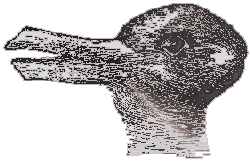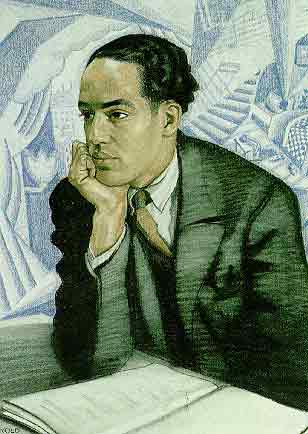 Gregory Eiselein
Gregory Eiselein Gregory Eiselein
Gregory Eiselein
 |
|
Langston Hughes
|
I have designed the semester as a multicultural "great books" course, selecting texts that are critically acclaimed, widely treasured, and historically momentous. The reading here is amazing. Harriet Jacobs is "the most important African American woman writer of the nineteenth century." Emma Lazarus authored some of the most famous lines in the history of American poetry: "Give me your tired, your poor, / Your huddled masses yearning to breathe free." Martin Amis says, "The Adventures of Augie March is the Great American Novel. Search no further." The New York Times has called Silko "without question . . . the most accomplished Indian writer of her generation." And so on.
Thus, our focus will be on both the cultural diversity represented by these texts as well as the historical traditions or aesthetic qualities that have made these texts classics or masterpieces.
We will explore questions such as: What differentiates these traditions? What connects these texts from different traditions and makes each "American"? What do these texts reveal about the cultural history of America? Why are these texts celebrated as literary-cultural landmarks in American history?
When you finish ENGL 655, you should be able to do the following:
This course also aims to intensify students' proficiency in the skills at the heart of a liberal education: the ability to reason, think critically, communicate effectively, and appreciate excellent writing and thinking.
Reading. The most important work in this course is the careful, patient, and thorough reading of the assigned texts. You will need to finish the assigned readings by the time indicated on the reading schedule. I encourage you to keep a reading journal or take reading notes on each text.
Attendance and Participation. In addition to careful reading, I expect active participation and good attendance from everyone. Some of the most significant discoveries will happen during class sessions, and there is no way to make up such a learning experience. Irregular attendance will hurt your grade; good attendance and active participation in class discussions will improve your grade.
Papers and Exams. The writing in our course will consist of two major essays and several informal and in-class writing assignments. I will also ask you to take part in a group project (a turn at teaching the class) and to take a midterm and a comprehensive final examination. During the semester, I will distribute handouts describing these assignments in more detail.
Revisions. If you would like, you may revise your two major papers. Each revision is due exactly one week after I return the initial draft. A revision does not automatically receive a better grade. The revision must be substantially improved. It must demonstrate significant change in ideas and focus, arrangement and organization, or evidence and development. Simply correcting typos or making editing corrections will not change the grade.
To submit a revision, you need to:
· Write a summary explaining why and how you revised—for example, how and why you decided to change the focus and organization; why you deleted or added a certain part; why and how you rearranged information; and so on.
· Hand-in your revision, your original paper, and my original comments along with your summary explaining the changes.
Late Papers. I don't usually accept late papers, but in certain, limited circumstances I will accept papers after the due date. Assignments will lose a letter grade for every class period that they are late. I collect papers at the beginning of class on the due date.
Grades. When I figure final grades, I will consider all of your class work: attendance, participation, group project, in-class assignments, longer writing assignments, and the two exams. The only assignments that will receive individual letter grades, however, are the exams and the final drafts of the two major essays. In determining final grades, each course requirement will carry the following relative weight:
· Essay 1: 20%
· Midterm Exam: 10%
· Essay 2: 30 %
· Final Exam: 20%
· Group Project: 10%
· Attendance, Participation, and In-Class Assignments: 10%
The Honor Code. Kansas State University has an Honor Code, which stipulates that you should do all your academic work at the university individually. Do not collaborate on any academic work unless specifically approved by your instructor. On all of your assignments, exams, and other course work, the following pledge is implied, whether or not it is explicitly stated: "On my honor, as a student, I have neither given nor received unauthorized aid on this academic work."
Perhaps the most serious violation of the Honor Code in an English course is plagiarism—taking or copying someone else's words or ideas as if they were your own. Plagiarism and cheating are serious offenses and may be punished by failure on the exam, paper, or project; the truly gnarly XF grade for the course; and/or expulsion from the university
Complete copies of the academic dishonesty policy are available in the Office of Student Activities and Services in the Union, or you may visit the Honor System web page.
Course Listserv. During the first couple weeks of class, I will subscribe each member of the class by your eID to an ENGL 655 listerv. I will then provide everyone with the listname. The purpose of this listserv is to try out ideas, to continue discussions and problem solving begun in class, and to facilitate communication among class participants outside of class. Posting to this listserv is not required; it is here strictly for our convenience. The only rule is this: all postings to the list should be related to our class in some way or another.
If you'd like to use a different e-mail address for the course listserv, you need to unsubscribe from your K-State address and subscribe again from your other address. To do this, log on with your K-State e-mail address and send mail to listserv@ksu.edu with this message:
UNSUB listname
Then log on with your other e-mail address and send a subscription command from that address to listserv@ksu.edu with the usual subscribe format:
SUB listname
If you have technical questions about using a listerv, you might want to check out K-State's listserv information page or contact the Help Desk: helpdesk@k-state.edu or 532-7722.
Students with Disabilities. If you need special accommodation in this course for a learning or physical disability, please contact Disabled Student Services in Holton Hall, Room 202 (532-6441), so that they may assist us in making arrangements.
For this first assignment I want you to write a sketch of who you are and where you come from. I want you to introduce yourself. Give us some of the luminous details of your life: hometown, unusual experiences, nationality, ethnicity, cultural background, reasons for choosing K-State, career plans, other plans, crimes or sins you've committed, noble deeds you've done, reasons for taking this course, your non-academic interests, where you live and what you live for, what you do in Manhattan, family, favorite T.V. program, favorite hangouts, favorite movie, favorite band, favorite sports, pet peeves, languages you speak, places you've been, special talents, age, height, weight, year in school, politics, religion, heroes, pets, etc. Tell us something about you that is important to you. Feel free to include or exclude anything about your life. Write in the first person and use a friendly (unless of course you're not friendly), conversational tone.
Length: 1-2 pages should be fine
Graded: Pass/Fail
Due Date: Wednesday, August 25
You will need to purchase a small coursepack [CP] of readings, available in the Eisenhower Hall Copy Center. The other texts are available at The Dusty Bookshelf (700 N. Manhattan Ave, in Aggieville across the street from Varney's).
Mark Twain, Pudd'nhead Wilson
Álvar Núñez Cabeza de Vaca, Adventures in the Unknown Interior of America
Zitkala-Sa, American Indian Stories, Legends, and Other Writings
Harriet Jacobs, Incidents in the Life of a Slave Girl
Emma Lazarus, Selected Poems and Other Writings
Langston Hughes, Selected Poems
Saul Bellow, The Adventures of Augie March
Maxine Hong Kingston, Tripmaster Monkey
Leslie Marmon Silko, Ceremony
Ana Castillo, My Father Was a Toltec, and Selected Poems
Greg's Home | Department of English | Graduate Studies | Cultural Studies | Visual Culture | Kansas State University |
This page was updated on 18 August 2004. Other pages on this site may have been updated more recently.
These pages are copyright © 1995-2004 Gregory Eiselein.